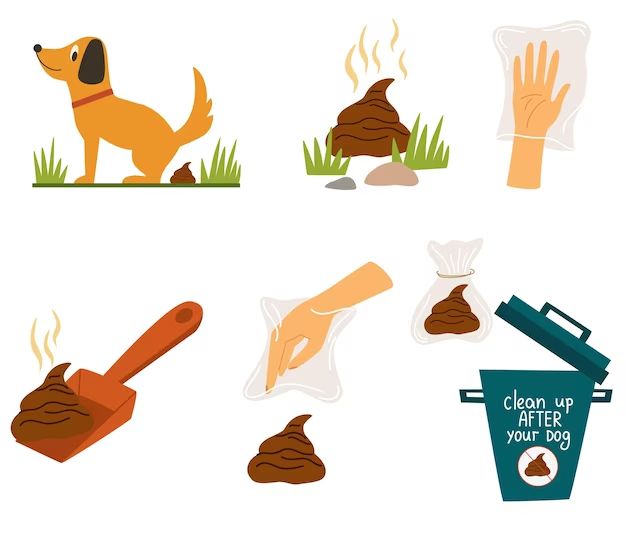Page Contents
Why it’s important to pick up dog poop
Dog waste is more than just a smelly nuisance. It poses health risks to humans and other animals if left on the ground in parks and public spaces.
Some key reasons why it’s important to pick up after your dog:
- Contains pathogens and parasites – Dog feces can contain dangerous organisms like e coli, giardia, salmonella, roundworms, hookworms and more. These can make people sick if they come into contact with contaminated soil or water.
- Water pollution – Dog waste left on the ground gets washed away by rain and irrigation and ends up in our lakes, rivers and oceans. The pathogens pollute waterways and beaches.
- Harmful to other animals – Leftover dog feces can transmit disease and parasites to other pets and wildlife if ingested.
- Ruins lawns – The high nitrogen content in dog urine and feces damages and burns grass if allowed to accumulate.
- Unhygienic – No one wants to see or step in dog poop. It makes parks and public spaces unclean and unpleasant.
For public health and environmental reasons, it’s a civic responsibility for all dog owners to promptly clean up after their pets in any public place.
How to pick up dog poop
Picking up dog poop is an unpleasant but necessary task for all responsible dog parents. Here are some tips for collecting and disposing of it properly:
- Come prepared – Always carry dog waste bags when walking your dog. Reusable bags, compostable bags or plastic grocery bags work well.
- Try a pooper scooper – A pooper scooper allows you to pick up waste without having to bend over or touch it. It’s a sanitary option.
- Wear gloves – Disposable gloves help keep your hands clean while picking up poop.
- Act quickly – Pick up solid waste immediately before it gets smeared or tracked around.
- Double bag it – Seal waste securely in a waste bag, then place that bag into a second bag to prevent leaks.
- Dispose in trash – Dog poop should go directly into a trash can. Never leave bags on the ground or “gift wrap” them.
- Wash hands – Thoroughly wash your hands with soap and water once done.
Picking up takes just a minute or two, and your fellow park users will appreciate the effort.
Where to discard dog poop bags
The sealed dog waste bags should be promptly disposed of in designated trash cans:
- Public park trash cans – Most city and neighborhood parks have dog waste stations with special trash receptacles. Prioritize using these.
- Streetside trash cans – If no dog waste cans are available, street trash cans are the next best option.
- At home – You can discard bagged waste in your household trash bin.
- Never drain or sewer systems – Dog waste can clog pipes and spread disease.
- Never organic waste bins – Dog poop should not go in compost bins.
- Never leave it on the ground – Bagged or unbagged.
Be sure to comply with any local ordinances in your area about proper dog waste disposal. Some municipalities prohibit use of public trash cans for pet waste.
Penalties for not picking up dog poop
There are legal consequences for dog owners who fail to pick up their pet’s waste in public areas:
- Fines – You may be cited and fined. Typical fines range from $50 to $200+ per offense.
- Community service – Some areas require offenders to perform community service by cleaning up parks.
- Property liens – Unpaid fines can result in liens placed on property owners.
- License revocation – Repeated violations may cause licenses for pets to be revoked.
Many municipalities even deploy “poop patrols” to catch and ticket offending dog owners. Additionally, you may be publicly shamed by other residents reporting you.
Using dog parks and designated areas
If available, designated dog parks and off-leash areas are ideal places to take dogs to relieve themselves. These have trash cans for waste disposal and are cleaned regularly. When using these:
- Review park rules about waste cleanup. Failure to comply may result in loss of park access.
- Carry extra bags in case the provided bags run out.
- Dispose of waste promptly even if your dog goes in bushes or concealed areas.
- Avoid letting dogs out of sight since you can’t clean up after them.
- Check for and fill any empty waste bag dispensers.
Following proper etiquette helps keep dog parks clean for everyone’s enjoyment.
Teaching dogs to go at home
The best way to ensure dog poop gets cleaned up properly is to teach dogs to go at home as much as possible:
- Establish a regular feeding and walking schedule so eliminations are predictable.
- Take dogs out on a leash straight to the potty spot. Give a cue like “Go potty.”
- Reward with praise and treats for going in the right place.
- Clean up all accidents in the house promptly.
- Consider paper training young puppies first.
- Gradually transition dogs to go outside only.
- Limit access to rooms until fully housetrained.
- Use crate training and confinement when you can’t supervise.
With time and consistency, most dogs can be potty trained to primarily go at home for easier cleanup.
Picking up dog poop keeps communities clean
Always carrying bags, promptly scooping poop, and properly disposing of it prevents disease, protects the environment, and keeps public spaces clean for everyone to enjoy. With extra effort at home, dogs can also be taught to primarily potty in your own yard. It’s every dog owner’s responsibility to pick up after their pets.
